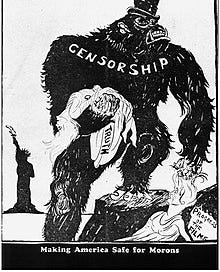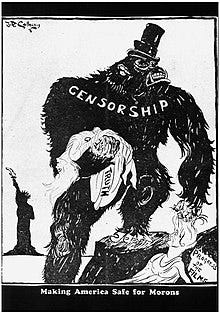Rumble Files Lawsuit to Challenge New York's Social Media Censorship Law
Second only to California is madness, New York once led the nation in promoting individual rights.
This article is published with permission from ReClaimTheNet. Please visit them and help them fight the fight to allow us to share ideas and facts that are unfortunate for some, and essential for others.
An anti-censorship cartoon that appeared in “The Film Mercury” magazine circa 1926.
Free speech video-sharing platform Rumble and its subscription platform Locals have sued New York Attorney General (AG) Letitia James to challenge a social media censorship law that they say would force platforms to target constitutionally protected speech.
Rumble and Locals are being represented by the free speech nonprofit Foundation for Individual Rights and Expression (FIRE) and are joined in the lawsuit by constitutional law professor Eugene Volokh, the co-founder of the Volokh Conspiracy legal blog.
We (Reclaim The Net) obtained a copy of the lawsuit for you here.
"The law is titled 'Social media networks; hateful conduct prohibited,' but it actually targets speech the state doesn’t like — even if that speech is fully protected by the First Amendment," FIRE said in a statement.
The law forces a wide variety of internet platforms to publish a policy detailing how they'll respond to posts that are deemed to "vilify, humiliate, or incite violence" based on protected classes such as religion, gender, or race.
It also requires platforms to create a way for visitors to complain about “hateful content” and requires them to respond to complaints directly. Platforms that refuse to comply can be investigated by the AG's office, subpoenaed, and fined up to $1,000 per violation.
It comes into force on Saturday, December 3, 2022.
As is often the case with censorship laws, this Social Media Networks; Hateful Conduct Prohibited law doesn't define "vilify," "humiliate," or "incite."
Rumble suggested that this means it would "cover constitutionally protected speech like jokes, satire, political debates, and other online commentary."
FIRE noted that the law’s scope is "entirely subjective" and suggested that it could target a wide range of First Amendment-protected speech such as "a comedian’s blog entry 'vilifying' men by mocking gender stereotypes" and most comments on almost any website "that could be considered by someone, somewhere, at some point in time, as 'humiliating' or 'vilifying' a group based on protected class status like religion, gender, or race."
FIRE added: "Bloggers, commenters, websites, and apps around the country are ensnared by the New York law due to its broad definition of 'social media networks' as for-profit 'service providers' that 'enable users to share any content.' This vague wording means that the law can impact virtually any revenue-generating website that allows comments or posts and is accessible to New Yorkers — but no government entity can legally compel blogs or other internet platforms to adopt its broad definition of 'hateful conduct.'"
“New York politicians are slapping a speech-police badge on my chest because I run a blog,” Volokh said. “I started the blog to share interesting and important legal stories, not to police readers’ speech at the government’s behest.”
Rumble Chairman and CEO Chris Pavlovski added: "New York’s law would open the door for the suppression of protected speech based on the complaints of activists and bullies. Rumble will always celebrate freedom and support creative independence, so I’m delighted to work with FIRE to help protect lawful online expression."
This law is one of several attempts by New York to encroach on the First Amendment and push for the censorship of constitutionally protected speech.
Other laws and proposals from the state have pushed to ban the sharing of violent crime videos online, ban gendered language in law, and allow officials to sue platforms that are suspected of "contributing" to the "knowing or reckless" spread of "misinformation.
If you support free speech, the eradication of cancel culture, and restoring privacy and civil liberties, please become a supporter (of Reclaim The Net).
REVOLVING DOOR
UK regulator appoints former Google exec as "Online Safety" head after online censorship bill is reintroduced
A former Google executive will play a key role in developing new "online safety" rules in the United Kingdom (UK) as a new censorship and surveillance law is expected to come into force.
Gill Whitehead, who was previously a member of Google's UK Management Group and previously led Google's consumer and market insights function across several continents, was appointed as the Group Director of Online Safety at the UK communications regulator, Office of Communications (Ofcom), yesterday.
The appointment was announced days after the UK government reintroduced the "Online Safety Bill" — a censorship and surveillance law that will empower Ofcom to levy huge fines against Big Tech firms that fail to enforce the censorship rules in their terms of service consistently.
Whitehead will start leading Ofcom's Online Safety Group from April 2023 as it starts preparing new rules that will "hold tech firms to account for prioritising their users’ safety."
Bloomberg reports that Whitehead's appointment is part of a trend of Ofcom being increasingly led by former Big Tech executives with Whitehead set to work alongside former Amazon and Meta executives.
While the reintroduced Online Safety Bill has dropped some controversial provisions that required platforms to censor "legal but harmful" content, many problematic aspects still remain.
First, large social media platforms will still be required to remove content that's prohibited in their terms and will face fines of up to 10% of their annual turnover if they fail to do so. Many of the Big Tech platforms already have far-reaching censorship provisions in their terms which result in millions of legal posts being taken down each year. This requirement creates an even stronger incentive for them to censor.
Second, a new criminal offenses that was introduced in the previous version of the Online Safety Bill — a "false communications" offense which criminalizes sending “information that the person knows to be false” with the intention of causing "psychological harm" to a "likely audience" with "no reasonable excuse" — is still in this version of the bill. Those convicted of a false communications offense can be imprisoned for up to 51 weeks in prison.
Third, internet companies will now have to offer adults tools to help them avoid certain types of "legal but harmful" content including "glorification of eating disorders, racism, anti-semitism or misogyny." These tools may include human moderation and warning screens. So while some legal but harmful provisions are gone, this provision will mean that a lot of legal but harmful content will be heavily censored under the Online Safety Bill, even if it's not removed from the platform.
Fourth, the plans to ban private messaging in the UK are still in the Online Safety Bill. A legal analysis that was published last week found that the bill gives the government the right to "impose technologies that would intercept and scan private communications on a mass scale." And according to the latest list of amendments to the Online Safety Bill, the government can still order companies to use "accredited technology" to break the end-to-end encryption in private messaging apps.
Fifth, a requirement for Ofcom to establish an "advisory committee on disinformation and misinformation" is still in the bill. This committee will advise Ofcom on “how providers of regulated services should deal with disinformation and misinformation” and how Ofcom can exercise its powers to counter so-called disinformation and misinformation on these services. The Online Safety Bill doesn't define misinformation or disinformation but the censorship during Covid demonstrated that these terms are often used as an excuse to censor posts that challenge government narratives.
Sixth, the government press release states that platforms "may have to use age assurance measures" when the Online Safety Bill comes into force. This means that adults could be forced to hand over highly sensitive information, by submitting scans of their identity documents or having their face biometrically scanned, in order to use social media platforms — a requirement that could put their most sensitive data at risk of being leaked.
Seventh, a new law that criminalizes putting someone's face on a nude body has been introduced with this version of the Online Safety Bill. Those convicted of this new offense can be imprisoned for up to six months.
And finally, the carve-outs that were included for large media outlets in the previous version of the bill are still here. UK state-funded media outlets, mainstream media outlets, and other outlets that are deemed to be a "recognised news publisher" are exempt from the new false communications offense that was introduced. This means that if an independent journalist fails to meet the stringent standards that are required to become a "recognised news publisher," they can be sent to prison for 51 weeks for sharing information that violates the false communications rules while the mainstream media can share the same information and without any punishment from the state.
We obtained a copy of the list of amendments to the Online Safety Bill for you here.
We obtained a copy of the original Online Safety Bill for you here.
You can see an overview of the original Online Safety Bill here.
The Online Safety Bill is due to return to Parliament next week. If it becomes law, its provisions are expected to come into force in Spring.
Rights groups have blasted the new version of the Online Safety Bill. Big Brother Watch Director Silkie Carlo said the bill "will hand power to Silicon Valley over Britons' rights." Index on Censorship went even further and suggested the Online Safety Bill "would not be lawful under our common law and existing human rights legal framework."





Astonishing how determined "progressives" are everywhere to censor free expression. New Yorkers are very fortunate that they have the protection of the US constitution to provide some kind of bulwark and legal leverage against it. Here in Canada and in the UK we have no such protections. There are a couple of online censorship bills working their way through Parliament here in Canada with really nothing to stop them but the whim of MPs and Senators.
It is quite amazing how over the past 6 years or so MSM has morphed into being openly pro censorship and opposed to free speech under the auspices of protecting us from mis/dis information. That there are many who were once pro free speech who are now pro censorship is a testament to the power of the real purveyors of mis/disinformation which is MSM. These morons believe everything they read/hear from MSM and assume that those who view alternative media also believe everything the read/hear and need to be protected by what I call Big Motherism. It also shows the power of being party trained. The party marchs from free speech to censorship and the party trained march along one step at a time. That is how 'liberalism' is morphing into fascism. Party loyalty is a social disease.